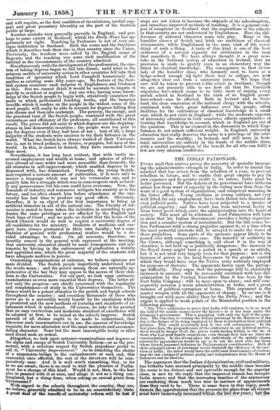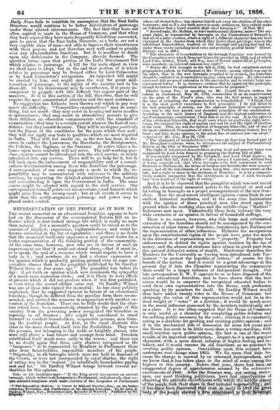THE INDIAN PATRONAGE.
EVERY mail that arrives proves the necessity of specially increas- ing the administrative strength in India. In order to amend the mischief that has arisen from the rebellion of a year, to prevent rebellion in future, and to enable that great empire to pay its own expenses and do greater credit to its rulers, India must be better governed. But the defects of its government have hitherto arisen less from want of capacity in the ruling men than from the want of a good system of organization, and competent manning in the lower offices. Young civilians or young soldiers' not very well fitted for any employment, have been thrust into financial or even judicial posts. Natives have been subjected to a species of political coquetry; and the result has been universal laxity in those lower posts which carry the administration into the heart of society. This must all be reformed. Lord Palmerston will have to show that his Indian Government provides a better organiza- tion and a sounder system of recruitment. But the bill comes be- fore Parliament with a strong prejudice against it, at a time when the most powerful interests will be arrayed to make the worst of those ,prejudices. Some parts of the measure appear likely to be passed over with comparative ease. The transfer of authority to the Crown, although something is said about it in the way of elocution, is not held up as politically dangerous; the increase to the Royal Army might turn a period in a speech or an article, but it is not used very largely even for that purpose ; nor is the increase of power to the local Governors by the greater control which they would have over the Native army seriously employed for purposes of rhetoric. The opponents fasten upon the patron- age difficulty. They argue that the patronage will be absolutely increased in amount; will be necessarily exercised with less dis- crimination by the Central Executive than it has been by the East India Company; will be more open to abuse ; and will con- sequently occasion a worse administration in India, and a great increase of political corruption at home. This argument is the master weapon with all the opponents of change : by no one is it brought out with more ability than by the Daily News ; and the engine is applied to weak points of the Ministerial position in the following passage. "The Times undertakes to prove that India will continue to be as much the field of the middle classes under the Queen's as it has been under the Company's government. This is grappling with only one half of the ques- tion. The objection to vesting the Indian patronage in the Ministers of the day is the danger of its being employed by them to strengthen their political position. This would necessarily lead to two evil consequences. In the first place from the preponderance of the aristocracy in our political parties, there would be danger of all the prizes worth having falling to the lot of those who had good family mine:mine, even though they had no other re- commendation. In the second place the individuals of the middle classes selected for appointments would be apt to be not the most able, but those whose friends possessed influence in Parliamentary constituencies. Both of those misapplications of patronage would' diminish the efficiency of the ser- vices in India • the latter would have the additional disadvantage of eradica- ting the last vestiges of political purity and independence from the House of
Commons and its electors. .
The argument that the Indian Administration, civil andmilitary, has hitherto been manned-principally by the middle class because the scene is too distant and not agreeable enough for the superior class, is met by the reply that the improved transit has brought India nearer, and that the increasing families of the aristocracy are rendering' 'them much less nice in matters of appointments thasthey used to be. There is some force in this reply, much force in the apprehension that the pressure for place from all classes iitist have immensely inerease4taiii1 00104 frg-yetira; but fain Diti New& fails M establish ita assumption that the East India Directors, weed continue to be better distributors Of patronage. under these altered circumstances. The fact that they have not often aspired to seats in the tout*. Of 'Commons, and that when they have aspired they have more frequently' failed than succeeded, goes to prove that the Festinate, Directors, as a body, are not a very capable class of men—not able to impress their count men with their powers, and not therefore very well suit,ed to preside over any administrative functions. But it is needlees to dwell upon any deficiencies in the Company, already dawned. The queetion turns"upon that portion of the India Go-vernmentBill 'Which relates to patronage. A bill for the mein object in vie* we shall have to adopt, but in the end that pertiOn of it Which relates to patronage may be framed either by Lord Palmerston or by Lord Palmerston's antagonists. An imperfect bill might be carried by him, and might open the 'way for great mal- vorsation of 'patronage, to the injury of the country and to his discredit. Or his Government may be overthrown; if it prove in- competent to grapple with this difficult but urgent part of the measure. It is in this section of the bill, therefore, that he will require GM most: concentrated attention and the Most aisistance. To sue4r;estion has hitherto been thrown out which in any way meets the difficulty. "Competitive examinations" May do some- thing, but not much: they may assist in keeping out mere noodle's or ignoramuses ; -they may assist in stimulatin!).; parents to give their Children an- education commensurate with the standard of examination ;they-may to a certain extent winnow the host of eart didates: but they cannot do more. They will in no degree positively test the fitness of the candidates for the posts which they seek ; they' will riot apply any tests to qualities which are most required in India. ' They will not enable us; as the war has done, to dis- cover in embryo the Lawrences, the Havelocks, the Montgomerys, the Colvini, the Inglises„ or the Oatrams. At active times,a re- liance upon mere seniority will not serve. The self-working pur- chase system cannot be introduced into the civil service, or newly introdriced, into any service. There will be no help for it, but to fall back upon the enforcement of responsibility and. of a consci- entious discrimination among .those who distribute the patronage. A correspondent of air own suggests a mode in which the re- ponsibility maybe concentrated with reference to the military services, by separating the detailed administration from London and concentrating it upon the Government in India. The same course might be adopted with regard to the civil Service. Our correspondent himself points out inconveniences an.d 'hazards which might arise from the arrangement; but at all events' it serves to show that the newly-augmented patronage and power may he placed under control.



























 Previous page
Previous page